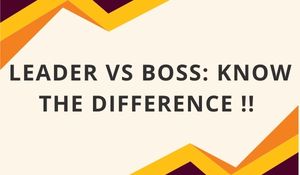
In order to be an effective leader, you need to have certain characteristics that distinguish you from a boss. A boss gives orders and expects them to be followed, while a leader inspires people to achieve common goals. In this blog post, we will discuss the key differences between leaders and bosses, as well as how to identify a leader in your organization. By understanding these differences, you can start becoming a better leader yourself.
Who is a Leader?
A leader is a person who takes charge of a group, organization, or country. The term derives from the Latin ‘to lead.’ Such people are usually “empowered to exercise influence over the behavior of others—and hold a position of leadership” (e.g., above a particular crowd). They guide followers and give them motivation. Consequently, they are in a position to wield power and often have opportunities to exert influence over others.
Who is a Boss?
A boss is commonly defined as “a person who is the head of a business or department.” In other words, an individual who holds leadership in an organization but lacks its authority. Because of this set of characteristics, bosses are more likely categorized as managers than leaders. If you’d like, think about some famous bosses throughout history (e.g., Adolf Hitler, Joseph Stalin). Did you consider them powerful yet sociable? Can you imagine giving one your utmost loyalty? Probably not! And that’s because there’s something within the leader-leader dynamic that captivates us and compels us to follow.

What is it about leaders that make them so different from bosses?
To find out, let’s explore the qualities of a leader. There are key characteristics shared by people who carry this title:
Empower others Empathy Goal-oriented Passionate Authentic Open-minded Selfless Decisive Willingness to take on responsibility Inspiring Influence over others Leadership Courageous Trustworthy Visionary Determined Strategic Ability to communicate Compassion Resourceful Appropriate decision-making skills Accountability Humble Integrity Strong morals Desire for change Agreeable Problem solver Motivator Supportive A sense of direction Responsibility Acceptance of criticism Conviction Leadership potential Team player Channels passion Creativity Values Diversity Creates a vision
In contrast, bosses ‘are generally mandated to manage the work-related functions of their employees. In other words, they direct where and when tasks are performed. They often have authority over personnel actions such as hiring and firing decisions. Because of this degree of influence, people who operate like bosses often have management skills.
So how do you know if someone is a leader or a boss? To make it simple, leaders instruct; bosses delegate. Leaders motivate; bosses discipline. Bosses order; leaders guide. And since leaders lead by example, they’re certainly not afraid to get their hands dirty (e.g., helping to fix the printer, attending company picnics). Or, as Zig Ziglar said, “You can have everything in life you want if you will just help enough other people get what they want.”
On the other hand, bosses are more likely to emphasize knowing the right things. They’re often focused on personal gain and monetary compensation. That’s because bosses are typically concerned with their own careers—and sometimes subordinate those around them—and not necessarily concerned with working together towards a common goal. The focus of a boss is self-advancement. And so, rather than become distracted by interpersonal conflict or trivial issues.
Characteristics of a Leader
A good leader requires several important qualities.
The five most important characteristics of a leader are communication, responsibility, confidence, motivation, and vision.
Communication: It is simply being able to communicate your thoughts in a way that makes it easy for others to understand you. To be a good communicator, you also need to listen. To motivate people and earn their trust and respect, they need to know what you stand for and the purpose behind what they do. If your workforce doesn’t feel like anything they do has value or doesn’t believe in the goals of an organization, then nothing gets done, and everyone becomes demotivated.
Responsibility: It is also known as accountability, the ability to answer for your actions. If you make a mistake, it is up to you to admit it and take steps towards learning from that mistake to avoid making the same mistake in the future. A good leader takes responsibility for mistakes made by their team and sees them as opportunities for improvement.
Confidence: It isn’t about being arrogant or egotistical – confidence comes from doing things well and knowing that you have control over a situation – even if there are obstacles. Confidence means taking organizations forward without getting flustered when something doesn’t go according to plan. This requires a lot of organization skills and making sure projects get completed on time.
Motivation: It is about being able to encourage people to work together successfully. This means having good negotiation skills, being a good communicator, using the right words at the right time, and showing interest in what other people are saying rather than talking about yourself all of the time.
Vision: The final characteristic is vision, which refers to your ability to see potential in opportunities where others see nothing. You need to be able to look beyond short-term goals for an organization and have a long-term plan that everyone believes in. One example might be Apple’s ‘Think Different’ campaign, which encouraged customers to believe they could do things differently too – this slogan comes from their visionary leader Steve Jobs who changed how we think about technology with his design ideas.
Characteristics of a Boss:
In this world of business, not everyone can be a boss. People need to know if they have the characteristics that make up a good leader and what those characteristics are. This article will discuss four traits every boss should have so their company can succeed.
1) Leadership
Every good boss needs to be able to lead their employees. They need to take the lead and show their employees what needs to be done. Without a leader, companies would crumble from within as those who were not capable of leading those under them refused to work hard for a company that didn’t have a good leader at the helm.
2) Passion
Every good boss needs to care about the employees they are leading and be passionate about what they do. Without passion, employees will feel like there is no point in working hard because their leader doesn’t seem to care about anything.
3) Communication Skills
A good boss needs to communicate with their employees to get the message across without being confusing or difficult to understand. Communication skills are extremely important when heading up a company because your employees need to know exactly what’s going on despite not being at board meetings all of the time.
4) Knowledge
Being a boss means you have been doing whatever you’re doing for a long time and have made many mistakes. This means you know what works and what doesn’t work, which is why your employees should always come to you with questions or concerns because there’s no one better than you to give them the answers they need.

Conclusion:
Leaders are not born, but they are made. They have key characteristics that differentiate them from a boss. If you can identify these traits in yourself and others, you will be able to lead more effectively. What other leadership qualities would you add to this list?
Author Bio:
Anji Velagana loves pursuing excellence through writing. He currently writes for Gologica.com, a global leader in providing the best online training to individuals who wish to take training on different abilities. He has experience of 5 years in the field of content writing. Contact him via LinkedIn.










